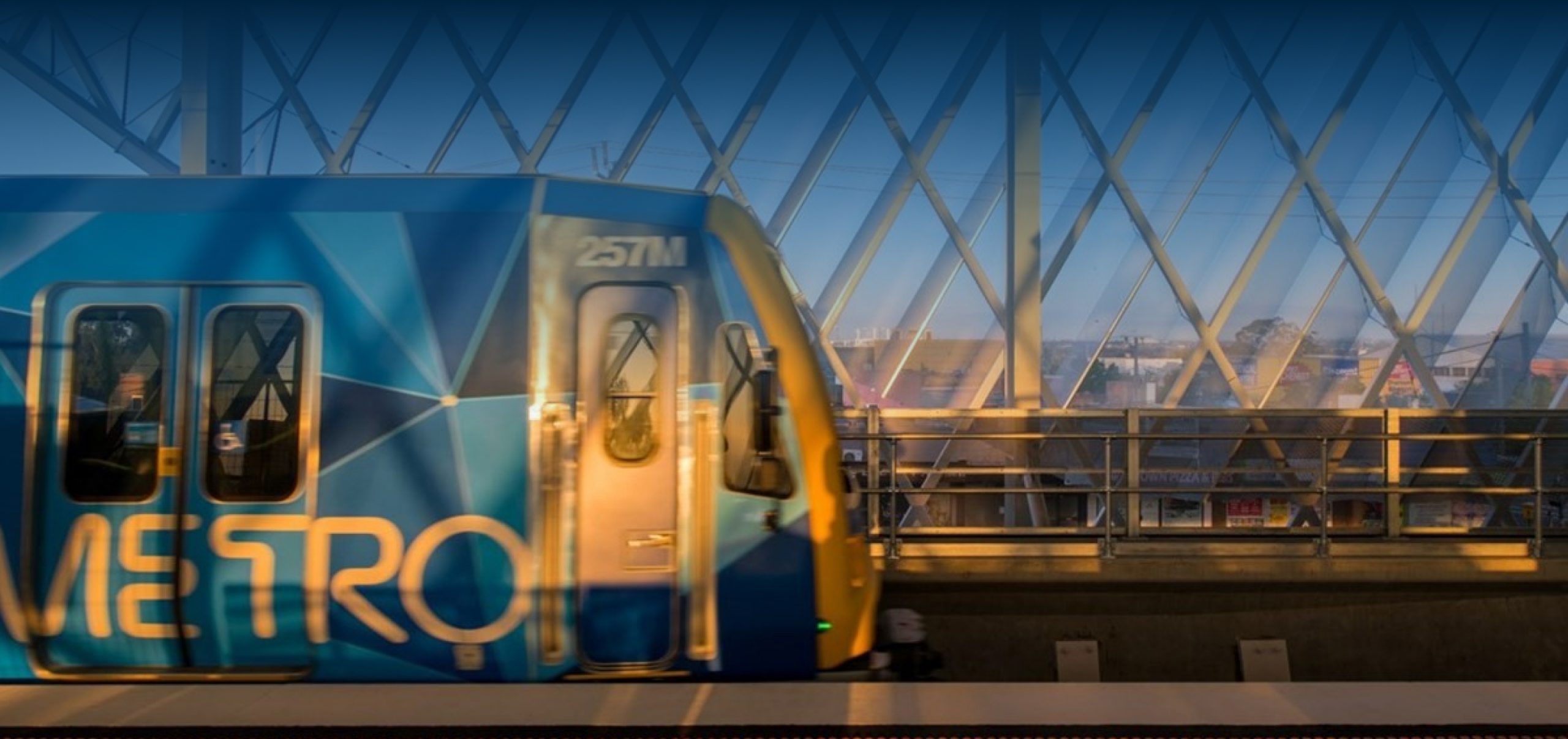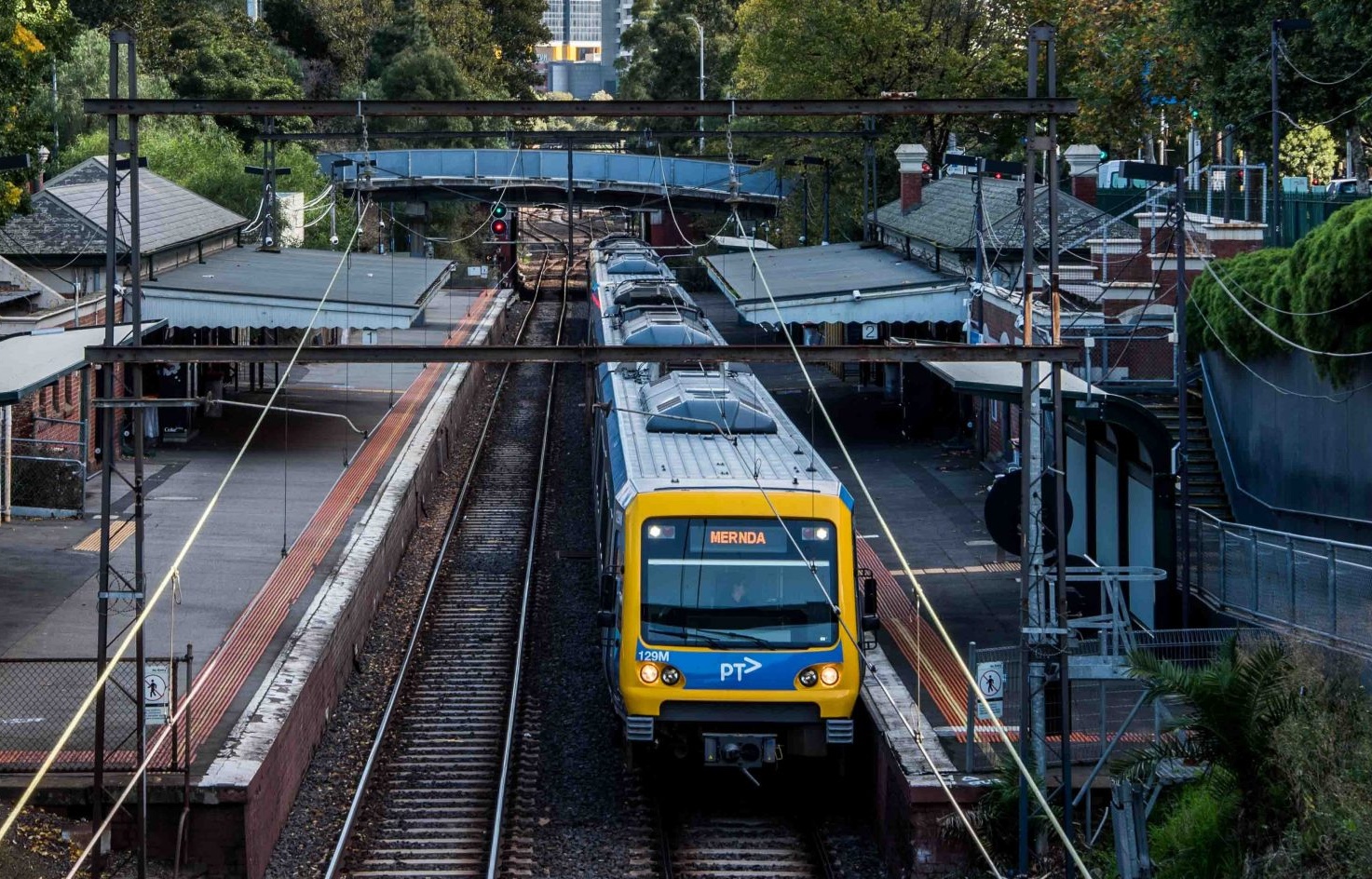
Add Trips for quick access to your most relevant travel information.
Add a Trip
- Good Service - trains are running on time to five minutes.
- Travel Alert - special instructions or information exists for this line.
- Service Change - special instructions or information exists for a train..
- Cancellation - special instructions or information exists for a cancelled train.
- Minor Delays - journey time may be increased with trains delayed by between five and 15 minutes, however stay with your planned travel.
- Major Delays - significantly longer journey time expected with trains delayed by over 15 minutes. Consider alternative transport while we rectify the delay.
- Works Alert - planned improvement works that are occurring within the next 24 hours that will alter scheduled services.
- Suspended - a section of this line has been suspended due to an unplanned disruption. Replacement buses will be used where possible but an alternative mode of transport should be considered.
Planned Works Visit Planned works
Timetable Search Visit Timetables
| Please note the order of the stops below this point can change | |||||||
| Please note the order of the stops above this point can change | |||||||
Frequently asked questions
Visit FAQ'sPolitical parties are prohibited from displaying any political advertising or allowing any political candidate, party or group to hand out political material or affix posters to station premises.
Political material includes flyers, stickers, handbills, brochures, t-shirts, balloons – anything containing a political message.
Metro’s property boundary will generally include all station platforms, buildings, carparks including internal roadways/footpaths/bridges/stairs/lifts and access ways with station carparks.
Political posters are not allowed to be installed on any building, structure or facility located in any section of Metro’s property, including the fence line. All political posters will be immediately removed from the fence line or property and disposed of appropriately.
Campaigners or candidates handing out flyers within Metro’s station property boundary will be politely asked to move to the footpath outside the boundary.
If you have questions or want to report political material at stations, contact PTV on 1800 800 007 – 6am to midnight daily (all night on Fridays & Saturdays).
The relevant section of the Public Transport Regulations is:
Transport (Compliance and Miscellaneous) (Conduct on Public Transport) Regulations 2015
Section 30 para (2):
A person must not while in or on a rail vehicle, road vehicle or rail premises –
a) distribute handbills; or
b) solicit money or goods from any person; or
c) busk – unless he or she has written authorisation from passenger transport company.
The MTM Franchise Agreement and Infrastructure Lease in regards to advertising material states the following:
Clause 3.7 Advertising section (h) iii
(h) Any advertising placed on the Land by or on behalf of the
Franchisee must:
(i) comply with all applicable Laws;
(ii) comply with voluntary codes of conduct established by the advertising industry;
(iii) not depict political, religious or other subject matter which is contentious;
(iv) not depict subject matter which is considered offensive; and
(v) not resemble or be capable of confusion with directional or informational signs either by shape, size or colour.
Every week Metro completes $12 million of work to maintain and renew our infrastructure, trains and technology. And we’re helping to deliver an unprecedented pipeline of major network improvements such as level crossing removals, the Metro Tunnel, bigger trains and new stations and track. We thank our passengers for their patience while we complete critical upgrade works that will deliver lasting benefits for all
Q.Why does Metro need to maintain and renew the network?
- Planned maintenance works are safety critical upgrades that keep the railway running safely and reliably for our passengers.
- Major project works, such as removing level crossings and building new stations, sometimes require buses to replace trains on section so network for days, weeks or even months.
Q.What are safety critical upgrade works?
- They can include replacing track, signals and other equipment or even cutting and clearing trees from along the sides of railway lines.
- Rails and overhead electrical wires are in contact with moving trains every day of the week and can wear down over time – so they need to be maintained, renewed and replaced on a regular basis.
- Sleepers (the concrete and timber slabs which lie underneath the rails) and ballast (the stones on which the sleepers lie) are regularly maintained and routinely replaced.
Q.What impacts should local residents or traders expect during planned works?
- maintenance works in and around the rail corridor near your property
- heavy machinery in the works area, including special track machines, excavators, front end loaders and chainsaws
- medium to high level construction noise during the set up and use of the heavy machinery
- Safety is our top priority in everything we do. The use of horns is a safety critical communication tool, to warn anyone nearby of a moving rail vehicle. This is an important safety measure to protect workers from unexpected vehicle movements.
- Rail grinding works are likely to take place in various locations. One of the outcomes of rail grinding is an increase in noise immediately after it has been completed. This short-term noise is generally expected to decrease over time.
- increased noise, dust and local traffic from workers accessing stored materials in the works area or the rail corridor
- road closures to facilitate critical safety works
- traffic management in place when required, to assist people and vehicles moving through the area
Q. Why can’t work be done when the trains aren’t running overnight during the week?
- For minor works, we can still keep running trains but for major works, such as replacing rails, sleepers or overhead wires, buses need to replace trains for safety reasons.
- Our priority is minimising the disruption to our passengers as a result of planned works as much as possible.
- Making the rail environment safe is our top priority.
- Services run 24 hours during weekends and from around 4am to 1am on weekdays. Freight trains and empty train movements operate 24 hours a day.
- Moving the required equipment, rail workers and materials into position for works, and carrying out the necessary safety checks, can take time.
- Trains can’t safely resume until these safety checks have been completed.
- Metro works hard to schedule these works at times when they are the least disruptive to passengers – usually at night and on weekends.
- When maintenance work requires a section of a rail line to be shut over a weekend, we schedule multiple pieces of work in to maximise productivity.
Car parking spaces are available at most stations across the network, for use by customers using public transport only. If you park at a Metro Station, please remember to lock all doors and remove all valuables from your vehicle.
Customers enter and use Metro car parks at their own risk. Metro is not responsible for any damage to vehicles or property loss in station car parks.
From time to time, track and equipment faults occur on the Metro network. Our priority is to minimise the disruptions to our passengers as much as possible.
Q. What’s the difference between train, track and equipment faults?
- Train faults are any issue relating to a train itself. For safety reasons, we may need to take the train out of service for repairs.
- Track faults are issues that affect the points and crossings on the railway (which allow trains to move from one track to another), sleepers, rails and train detection systems.
- Equipment faults are all issues impacting other rail infrastructure, including signalling, level crossings and overhead electrical lines – all of which are critical to running a safe and reliable service.
Q. Why does faulty equipment cause trains to be delayed or suspended?
- If trains, tracks, signalling or electrical systems are damaged, Metro may be required to slow or even suspend train services for a period of time.This process ensures the safety of our passengers and employees.
- If a fault occurs, our systems are designed to prevent further safety issues from occurring. For example, if a system fails or is damaged, signalling equipment will automatically tell an approaching train driver to stop for safety reasons.
- Metro has maintenance crews across different engineering fields (such as signalling, electrical, track and structures) available right across the metropolitan network.
- This means they can quickly travel to an area where a problem has occurred and undertake any necessary repairs to get passengers moving again as soon as possible.
- In some cases, what was originally reported to be a fault may turn out to be vandalism (such as cable theft or graffiti) or another external cause (such as a third-party power fault or a vehicle colliding with a bridge).
- When responding to these disruptions, our priority will always be the safety of our passengers an employees and keeping you informed.
Q. Why does rail equipment become faulty and what are you doing to prevent them?
- To ensure rail equipment is operating at its best to get passengers where they need to go, Metro carries out $12 million in maintenance to infrastructure, trains and technology every week.
- There are millions of different components on our network that we routinely check and maintain – occasionally some of these will become faulty.
- Our engineers and technicians regularly inspect and maintain the tracks, points, crossings, signals and overhead wires.
- Our teams are working hard every day to minimise delays caused by trespassing, emergency services requests, equipment faults, ill passengers, vandalism, external power outages, infrastructure upgrade works, vehicles on level crossings and extreme weather.
- Metro assesses the condition of the track and overhead wires using ultrasound, laser, vibration and visual recording equipment.
- We focus maintenance efforts on the most common types of infrastructure faults based on detailed data.
- Based on this data we have been proactively monitoring, fixing or replacing the infrastructure most likely to cause an incident that impacts on passengers.
- This meant putting extra focus on points, track circuits, and signals, all of which can have a direct impact on improving performance on the network.
Illegal behavior can be dangerous and delays our passengers.
Q. Why are services delayed by trespassing?
- Trespassing on the railway is incredibly dangerous and can stop trains in their tracks – causing significant and unnecessary disruption to our passengers.
- New anti-trespasser ground panels are being trialled at five railway stations across the network to improve safety and curb the number of incidents that delay passengers. The innovative panels – both a physical and visual deterrent – discourage pedestrians from taking illegal shortcuts at their local station, improving the reliability of services for all passengers. They feature raised rubber pyramids to create an unstable surface, making it difficult for pedestrians to get around them and onto the rail corridor.
- Our Network Security and Surveillance (NSS) team is a special unit tasked with keeping passengers and Metro workers safe and cracking down on people illegally accessing the network.
- NSS officers use Metro’s 9,000-strong CCTV camera network – which includes cameras at stations and inside trains – as well as state-of-the-art surveillance equipment – such as drones, a purpose-built mobile CCTV trailer and thermal-imaging cameras.
- All intelligence, including surveillance images and CCTV, is provided to Victoria Police to support investigations, and bring criminals to justice through the courts.
- People caught trespassing on the Metro network can be fined up to $3,304.
Q. How does vandalism of a train cause delays and cancellations?
- Graffiti and vandalism has no place on our network – it’s ugly, illegal and an issue we continue to tackle across the community. Vandalism to trains and rail equipment can cause disruption to our passengers.
- For example, broken windows and damaged doors on trains can create safety issues– and the train needs to be taken out of service for repairs.
- Forcing doors on trains can damage the door-locking mechanism and the train has to be removed from service – which can result in a cancellation.
- Train doors are not like those on a lift. It’s never safe to try to prevent them from closing.
Q. What is Metro we doing to reduce incidents of vandalism?
- Metro spends $10 million each year to prevent and clean up graffiti and vandalism.
- Metro has hundreds of station employees and Authorised Officers on the network every day to keep our passengers safe and crack down on vandalism.
- The specialist Network Security and Surveillance team is tasked with tackling incidents of graffiti, vandalism and trespass across the network.
- They work closely with Victoria Police to detect, deter and prosecute vandals who damage our trains and rail equipment.
- Technology including mobile CCTV cameras and surveillance drones are also being deployed to reduce crime on the network.

Tickets & Fares
Myki is your ticket to ride on Metro. Simply keep your myki topped up and carry it with you, and you’ll always be ready to travel. Just touch on and off when you travel and myki will automatically calculate the lowest fare for you.
Find out moreAdding your trips will allow the homepage to better provide you with relevant information.
Add your trip



